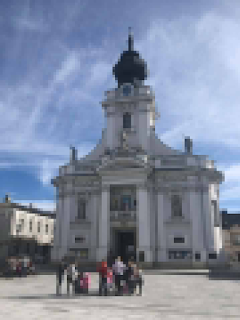 |
| The central church at Wadowice, Poland |
While visiting Wadowice during our first full day in Poland, we learned about the childhood of Pope John Paul II. Learning about his living situation, how he was brought up, and what the community was like back when John Paul II was growing up gave us more insight into the relations between Christians and Jews before the start of World War II. We also attended a Sunday Mass at the central church located in Wadowice. These masses ran a couple of times per day, extending well into the afternoon. This is something that I had never experienced before, as my parish only runs Sunday morning mass, not running into the afternoon like this parish did. It was honestly really interesting as well, some of the little nuances of this mass were different from what I experienced in my own hometown. During my time there, I was also told of a story back when John Paul II was a child before the outbreak of WWII, during our tour of the Pope John Paul II museum, located in the building where his house used to be. At the time, he was friends with a Jewish boy named Jerzy Kluger, whom he later reconnected with years after they lost touch. Not only were their relationships strong, but they commonly visited one another, immersing themselves in each other's culture. There was a time when Jerzy Kluger did eventually walk into the church in search of his friend, who was in the church at the time. One of the parishioners looked at Kluger funny and questioned why he was even present in the church in the first place. John Paul II allegedly responded: "Aren't we all God's children?" This story reminded me about something called the teachings of contempt and respect. The teaching of contempt itself in relation to anti-semitism has been around for thousands of years before this story, laced into the teachings of the Roman Catholic Church and it’s offspring for centuries. People like St. Augustine, Martin Luther, and even some popes all expressed these feelings, which shaped church doctrine and ultimately resulted in the negative preconceptions aimed at Jews that surfaced during the 1930’s-1940’s. Then there is the teaching of respect, which is meant to combat anti-semitism. Fighting against the catalysts to anti-semitism was something that became prevalent after the events of the Shoah, and John Paul II’s words show how this respect was present back before the Shoah, although not as prevalent. However, this teaching of respect can also apply to almost every aspect of our lives today. Being able to move past discrimination and learning how to love other individuals, no matter who they are, is something that society needs to work on to this day. This teaching of respect shouldn’t only be utilized to fight against anti-semitism. There are so many other fields of interest where this respect is needed. If we, as a society, can come together and learn to love another, then we can truly progress forward.


0 comments:
Post a Comment